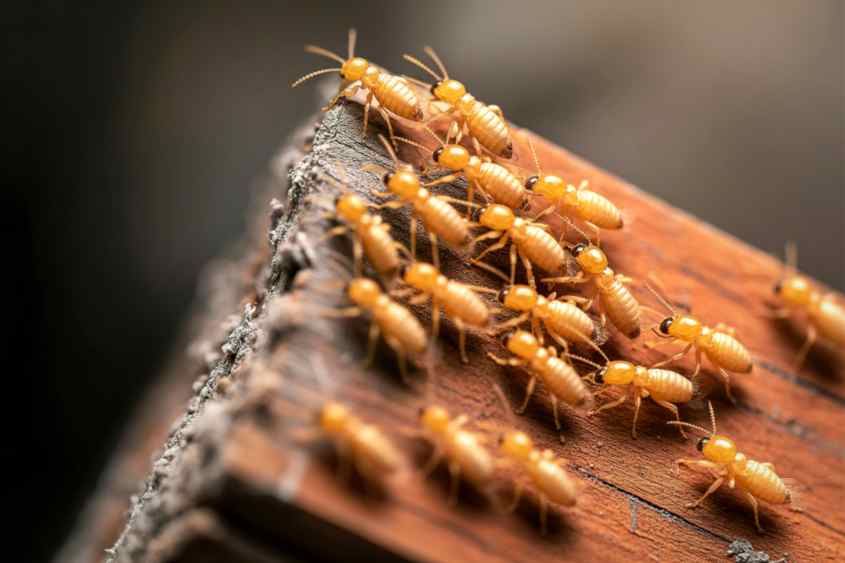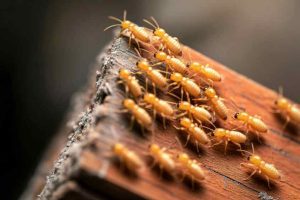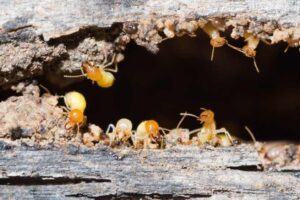
Home » Maintenance » Termites and Pest Control in Body Corporate Schemes
A personal approach
to body corporate management
That’s why we take the time to listen, tailoring our management approach to suit every person, their communication style and business preferences.
Receive an obligation
free proposal
Please contact us here if you are seeking a proposal for a building we don’t currently manage. If you are an existing BCsystems customer please email us at info@bcsystems.com.au
Pest management is an important maintenance issue in body corporate schemes. Termites, in particular, pose a significant threat to timber constructions, while other pests can affect both the safety and hygiene of the building and its residents.
Responsibility for pest control is shared between lot owners and the body corporate, and both parties must act to prevent costly damage and serious safety risks.
This article touches on who is responsible for pest control, including in exclusive use areas, and the implication when a pest infestation spreads.
Responsibilities for Pest Control
Pest management is considered a maintenance obligation under Queensland’s body corporate legislation. Both the body corporate and lot owners have duties to carry out pest control where it is necessary to prevent damage and maintain lots and common property in a good and structurally sound condition.
Body Corporate Responsibilities
The body corporate is responsible for maintaining common property, which includes pest management where infestations could affect the structure or condition of the property. This typically involves:
- Conducting regular inspections of common areas to identify potential pest issues.
- Implementing preventative measures, such as sealing entry points, managing moisture, and maintaining landscaping.
- Arranging professional inspections and treatments for pests affecting common property.
- Allocating funds in the administrative and sinking fund budgets for ongoing pest maintenance.
Pest control carried out by the body corporate is part of its broader maintenance obligations and is essential to prevent damage to both common property and adjoining lots.
Body Corporate Responsibilities
Lot owners are responsible for maintaining their own lots, including pest management inside the lot, to prevent structural damage and infestations from spreading. Responsibilities include:
- Arranging inspections and treatment of pests within the lot as required.
- Keeping the lot clean and free from conditions that encourage infestations.
- Taking preventative measures, particularly against termites, to protect the property.
- Educating tenants about the importance of reporting and addressing pest issues promptly.
Lot owners’ pest control duties are considered routine maintenance under the Act and must be undertaken to prevent harm to the lot itself, neighbouring lots, or common property.
Determining Responsibility
To clarify specific responsibilities in your scheme, it is important to know which type of plan of subdivision applies. The registered survey plan shows the boundaries of lots and common property, which defines maintenance obligations.
Queensland schemes are usually registered under:
- Building Format Plans (BFPs), covering multi-level apartments or townhouses.
- Standard Format Plans (SFPs), covering free-standing houses or villas within a collective scheme.
Responsibility in Exclusive Use Areas
In most cases, lot owners are responsible for managing pests in their exclusive use areas. This includes maintaining the area to prevent infestations, arranging inspections, and treating issues such as termites, ants, or cockroaches.
The body corporate may become involved if a pest problem originating in an exclusive use area threatens other lots or the building structure. For example, if termites from a courtyard start affecting the building or neighbouring lots, the body corporate may need to coordinate inspections and treatment.
When a Pest Infestation in a Lot Threatens Common Property
In some cases, pests may start in an individual lot but have the potential to spread and affect shared spaces or other lots. For example, termites in a timber floor, ants nesting in a balcony, or rodents entering through small gaps can quickly move into gardens, roof spaces, or structural elements that form part of the common property.
In these situations, both the lot owner and the body corporate have roles to play. The lot owner is responsible for addressing the infestation within their property promptly, arranging inspections and treatment to prevent the problem from spreading. At the same time, the body corporate may need to coordinate action to protect common areas and other lots, particularly if the infestation is likely to cause structural damage or affect neighbouring residents.
Communication is crucial. Lot owners should notify the body corporate as soon as they become aware of a potential threat, enabling a coordinated response. This approach ensures that treatment is effective, minimises damage, and reduces the risk of disputes between owners.
In some cases, the body corporate may arrange for professional pest control to inspect and treat both the lot and adjacent common areas, with the costs for the work potentially recoverable from the lot owner if the infestation arose due to their inaction.
Clearwater on Burleigh Cove [2020]: Lot Owner Responsibility for Preventing Termites from Common Property
Queensland adjudicator decisions make it clear that lot owners have an important role in preventing termite infestations, even when the source may be common property. In Clearwater on Burleigh Cove [2020], it was determined that lot owners are responsible for taking preventative measures to stop termites from entering their lots from surrounding common areas.
This ruling highlights that while the body corporate manages inspections and treatment of common property, individual owners must also act proactively to protect their own units. Preventative measures may include maintaining physical barriers, keeping gardens tidy, ensuring mulch or timber is stored away from building structures, and arranging regular termite inspections within the lot.
Related content
Share This Post
Subscribe To Our Newsletter
More To Explore

Termites and Pest Control in Body Corporate Schemes
Pest management is an important maintenance issue in body corporate schemes. Termites, in particular, pose a significant threat to timber constructions, while other pests can affect both the safety and hygiene of the building and its residents.

Balconies in a Body Corporate: Who is Responsible for Repairs and Maintenance
In this article, we explore the common issues that affect balconies and decks and explain who is generally responsible for repairs and maintenance, depending on whether your property is registered under a Building Format Plan (BFP) or a Standard Format Plan (SFP).


